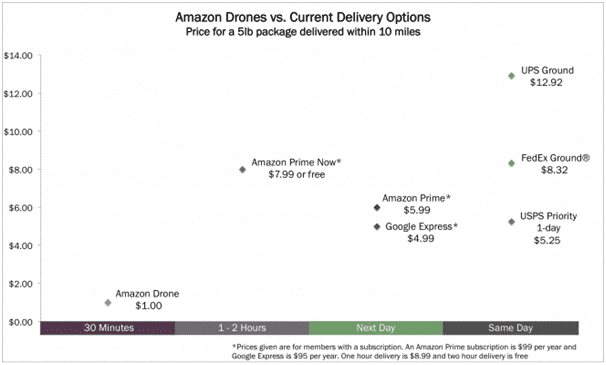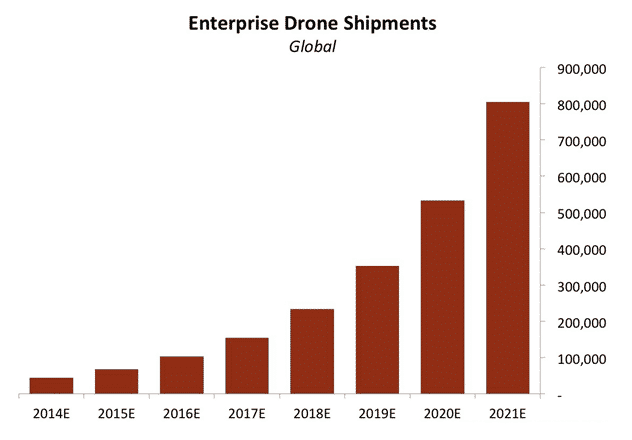We have come way ahead of concentrating solely on automation through data-driven software. These software that offers valuable insights and powers important decision-making has been here for a while now. It’s time to look forward and experiment with newer and more exciting innovations. Right now, drones seem to be the answer.
About two years ago, an Audi sUVA commercial grabbed eyeballs with its futuristic presentation of transport drones, parodying the superhero, Terminator. It’s been some time that industries worldwide have realized that automation will drive their future. The prediction soon became a reality with Amazon’s 30-Minute drone delivery – driving home the immense possibilities of this tech innovation. Google X’s drone delivery system named Project Wing, patented and announced in 2014, targets a 2017 launch. DHL, the global shipment delivery service, has also been experimenting with the idea of drone delivery system called Microdrones.
Keith Kaplan, the Head and Event Organizer of the Unmanned Aerial Vehicle Systems Association believes that “The drone economy is exploding.” If Dave Vos, the Head of Google Vox’s Project Wing is to be believed, drones will be a safer mode of transport for freight than the aircraft’s of the aviation industry.
It’s early days for industrial drones. The effective implementation of these in the logistics industry will serve as a safe and efficient means of freight transport. Today’s businesses understand the necessity of quicker delivery systems for ensuring brand loyalty from existing customers and acquisition of new customers. They collaborate with third-party logistics (3PL) companies for better supply chain management. No wonder, smart businesses are always on the lookout for updated technologies for improving their business outcomes. This in turn will enable them to pass a chunk of their increased profit margin to their customers, reducing the costs for services offered.

Image Courtesy: cyzerg
Automation and IoT has, therefore, emerged as the relevant technology that enhances the speed of delivery and accountability towards their customers. Here are some reasons how industrial drones will maximize the business efficiencies for the logistics industry:
1. Tracking inventory with greater accuracy
Cloud technology has made it possible for businesses to trace data, take stocks and keep records of the same. Robotic drones take this a step further, ensuring more accuracy. They can be controlled by humans simply by activating the drone robotic assistant with the click of a few buttons.
2. Quicker pickup & delivery
As Amazon’s 30 Minutes business model makes it apparent, delivery with record timings to nearby locations will become possible. It will also make the concept of same day delivery a reality.
3. Makes returns & replacements hassle-free
Drones also make it possible for businesses to offer speedier service for replacement and returned shipments. The delivery process for replacements can be initiated when the cargo being returned is in transit. It guarantees faster turnarounds for quicker resolutions, removing e-commerce barriers.
4. Automate moving of freight
Drones will do away with moving, sorting and loading of shipment from warehouses and unloading at the destination through manual labour. What’s more, multiple drones can be deployed for meeting increased demands of freight booking. It offers better flexibility in re-configuring the pickup and delivery points, improving handling performances and reducing labour costs. A PwC Survey reports that drones are expected to help businesses save a whopping $125 billion, as evident from the graphical presentation below.

Image Courtesy: Business Insider
5. Improved surveillance for reducing theft
It will be a superior substitute for traditional video cameras, as it will offer accessibility to places that cameras cannot reach out to. This empowers drones to survey warehouses and reduce thefts.
6. Enhanced freight security
Besides being used as a freight carrier, drones can also be used for improving security of shipments. These specialized security drones keep a close eye on the cargo being transported via rail, road and waterways and also watch over ships loaded with high-value cargo. Some global freight transportation companies strongly believe that security drones account for about 44% reduction in the number of thefts in the first half of 2015.
7. Instant transportation of spare parts
Unforeseen circumstances like breakdown of trucks being used for cargo transportation, leading to loss of crucial time and revenue. Using drones to supply the necessary spare parts in case of machine failure emphasizes further on the path-breaking innovation that drones are.
Author’s Bio: Sharon Fernandez is a senior technical writer for Trip In. She loves traveling, singing and is a big movies buff. She has an experience of 5+ years ranging from Logistics, Supply Chain Management and Manufacturing.





